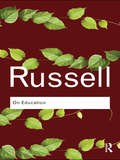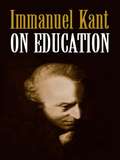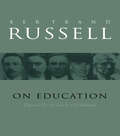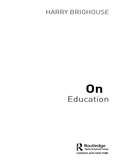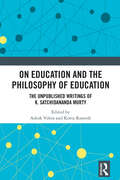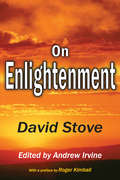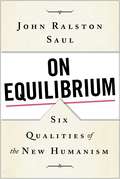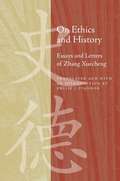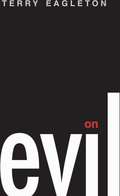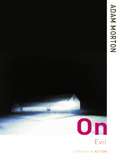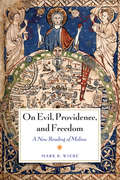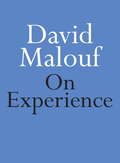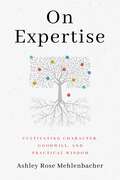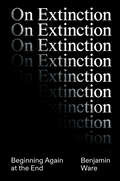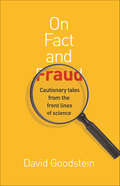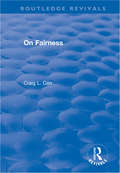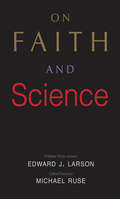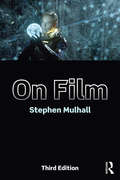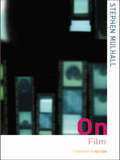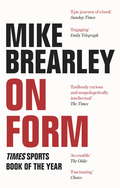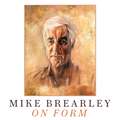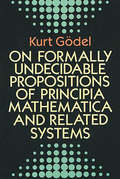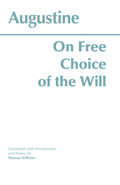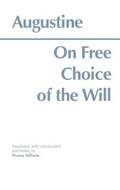- Table View
- List View
On Education
by Bertrand RussellBertrand Russell is considered to be one of the most significant educational innovators of his time. In this influential and controversial work, Russell calls for an education that would liberate the child from unthinking obedience to parental and religious authority. He argues that if the basis of all education is knowledge wielded by love then society can be transformed. One of Bertrand Russell’s most definitive works, the remarkable ideas and arguments in On Education are just as insightful and applicable today as they were on first publication in 1926.
On Education
by Immanuel Kant"One of the greatest problems of education," Kant observes, "is how to unite submission to the necessary restraint with the child's capability of exercising his free will." He explores potential solutions to this dilemma, stressing the necessity of treating children as children and not as miniature adults. His positive outlook on the effects of education include a conviction that human nature could be continually improved; to achieve this end, he advocated that pedagogy, the science of education, be raised to academic status and studied at a university level -- an innovative notion for the 18th century.
On Education (Thinking in Action)
by Harry BrighouseWhat is education for? Should it produce workers or educate future citizens? Is there a place for faith schools - and should patriotism be taught? In this compelling and controversial book, Harry Brighouse takes on all these urgent questions and more. He argues that children share four fundamental interests: the ability to make their own judgements about what values to adopt; acquiring the skills that will enable them to become economically self-sufficient as adults; being exposed to a range of activities and experiences that will enable them to flourish in their personal lives; and developing a sense of justice. He criticises sharply those who place the interests of the economy before those of children, and assesses the arguments for and against the controversial issues of faith schools and the teaching of patriotism. Clearly argued but provocative, On Education draws on recent examples from Britain and North America as well as famous thinkers on education such as Aristotle and John Locke. It is essential reading for anyone interested in the present state of education and its future.
On Education and the Philosophy of Education: The Unpublished Writings of K. Satchidananda Murty
by Ashok Vohra Kotta RameshThis volume is a collection of K. Satchidananda Murty's unpublished writings. It presents Murty's views on the theory and praxis of education. Murty advocates for free universal education and presents a charter for education in the 21st Century which promotes higher studies in mathematics, science, and technology. He provides a comparative analysis of Western and Asian curriculums and explores the possibilities of introducing more courses on Eastern philosophy. The essays also tackle the teacher-student relationship, moral education, and discipline in the classroom. An important contribution, the book presents K. Satchidananda Murty's contribution to philosophy during sixty-one years of his engagement with active writing and teaching. It will be of great interest to scholars, teachers, and students of education, Indian philosophy, Asian Philosophy, comparative philosophy, religious studies, and South Asian studies.
On Enlightenment
by David StoveThe idea of enlightenment entails liberty, equality, rationalism, secularism, and the connection between knowledge and well being. In spite of the setbacks of revolutionary violence, mass murder, and two world wars, the spread of enlightenment values is still the yardstick by which moral, political, and scientific advances are measured. In On Enlightenment, David Stove attacks the roots of enlightenment thought to define its successes, limitations, and areas of likely failures.Stove champions the use of reason and recognizes the falsity of religious claims as well as the importance of individual liberty. He rejects the enlightenment's uncritical optimism regarding social progress and its willingness to embrace revolutionary change. What evidence is there that the elimination of superstition will lead to happiness? Or that it is possible to accept Darwinism without Social Darwinism? Or that the enlightenment's liberal, rationalistic outlook will lead to the social progress envisioned by its advocates?Despite best intentions, says Stove, social reformers who attempt to improve the world inevitably make things worse. He advocates a conservative approach to change, pointing out that social structures are so large and complex that any widespread social reform will have innumerable unforeseen consequences. Writing in the tradition of Edmund Burke with the same passion for clarity and intellectual honesty as George Orwell, David Stove was one of the most articulate and insightful philosophers of his day.
On Equilibrium: Six Qualities of the New Humanism
by John Ralston SaulIs it moral to sacrifice one's life for a higher goal? Why do many in the U.S. think it admirable to join the army but despicable for Palestinians to sign up with Hamas? How can we actually determine "evil" and "good" in the daily world? These practical questions cut to the heart of what it means to be human. John Ralston Saul, in his matter-of-fact discussion of six basic human qualities — ethics, common sense, intuition, imagination, memory, and reason — confronts basic concepts in a manner not done since Thomas Paine more than two centuries ago. In an easy-to-understand style, Saul explains why essential qualities of being human cannot exist in isolation but instead depend on and enrich each other. On Equilibrium persuasively explores morality and how it can be used to foster equilibrium for the self and achieve an ethical society.
On Ethics and History
by Philip J. IvanhoeZhang Xuecheng (1738–1801) has primarily been read as a philosopher of history. This volume presents him as an ethical philosopher with a distinctive understanding of the aims and methods of Confucian self-cultivation. Offered in English translation for the first time, this collection of Zhang's essays and letters should challenge our current understanding of this Qing dynasty philosopher. On Ethics and History also contains translations of three important essays written by Tang-dynasty Confucian Han Yu and shows how Zhang responded to Han's earlier works. Those with an interest in ethical philosophy, religion, and Chinese thought and culture will find still relevant much of what Zhang argued for in his own day.
On Evil
by Terry EagletonFor many enlightened, liberal-minded thinkers today, and for most on the political left, evil is an outmoded concept. It smacks too much of absolute judgments and metaphysical certainties to suit the modern age. In this witty, accessible study, the prominent Marxist thinker Terry Eagleton launches a surprising defense of the reality of evil, drawing on literary, theological, and psychoanalytic sources to suggest that evil, no mere medieval artifact, is a real phenomenon with palpable force in our contemporary world. In a book that ranges from St. Augustine to alcoholism, Thomas Aquinas to Thomas Mann, Shakespeare to the Holocaust, Eagleton investigates the frightful plight of those doomed souls who apparently destroy for no reason. In the process, he poses a set of intriguing questions. Is evil really a kind of nothingness? Why should it appear so glamorous and seductive? Why does goodness seem so boring? Is it really possible for human beings to delight in destruction for no reason at all?
On Evil (Thinking in Action)
by Adam MortonEvil has long fascinated psychologists, philosophers, novelists and playwrights but remains an incredibly difficult concept to talk about. On Evil is a compelling and at times disturbing tour of the many faces of evil. What is evil, and what makes people do awful things? If we can explain evil, do we explain it away? Can we imagine the mind of a serial killer, or does such evil defy description? Does evil depend on a contrast with good, as religion tells us, or can there be evil for evil's sake?Adam Morton argues that any account of evil must help us understand three things: why evil occurs; why evil often arises out of banal or everyday situations; and how we can be seen as evil. Drawing on fascinating examples as diverse as Augustine, Buffy the Vampire Slayer, psychological studies of deviant behaviour and profiles of serial killers, Adam Morton argues that evil occurs when internal, mental barriers against it simply break down. He also introduces us to some nightmare people, such as Adolf Eichmann and Hannibal Lecter, reminding us that understanding their actions as humans brings us closer to understanding evil.Exciting and thought-provoking, On Evil is essential reading for anyone interested in a topic that attracts and repels us in equal measure.
On Evil, Providence, and Freedom: A New Reading of Molina
by Mark WiebeThis original study is concerned with the reconciliation of divine providence, grace, and free will. Mark Wiebe explores, develops, and defends Luis de Molina's work in these areas, and bridges the main sixteenth-century conversations surrounding Molina's writings with relevant sets of arguments in contemporary philosophical theology and philosophy of religion. The result fills a gap between theologians and philosophers working in related areas of study and is a unique contribution to the field of analytic theology. Wiebe begins by sketching the historical and theological context from which Molina's work emerged in the late sixteenth century. He then lays out Thomas Aquinas's understanding of God's nature and activity, as well as his understanding of the relationship between God's action and creaturely activity. In the face of challenges like the Problem of Evil, Wiebe argues, Molina's work is a helpful supplement to Aquinas's thought. Turning to direct consideration of Molina's work, Wiebe responds to several of the most well-known objections to Molinism. In support of Molina's understanding of creaturely freedom, he then develops some twentieth-century work in free will philosophy, focusing on the work of thinkers like Austin Farrer, Timothy O'Connor, and Robert Kane. He argues that there are good reasons to defend a restrained version of libertarian or noncompatibilist free will, and also good reasons to believe this sort of freedom obtains among human agents. Wiebe concludes that a Molinistic revision of Eleonore Stump's work on the relationship between providence and free will provides a well-rounded, coherent theological option for reconciling divine providence, grace, and free will. This thoughtful study will appeal to theologians and philosophers, as well as educated readers with a basic knowledge of Christian theology.
On Experience
by David MaloufAustralia's much-loved author David Malouf presents a dazzling and illuminating personal essay on the power of imagination-and its effects on the life of a writer-in this first instalment of a collectible new series. Beautifully packaged as a pocket-sized keepsake, this treasurable approach salvages a popular writer's inner philosophy from the disposability of journals and magazine columns for the sake of his fans and lovers of esoteric literature the world over.
On Expertise: Cultivating Character, Goodwill, and Practical Wisdom (RSA Series in Transdisciplinary Rhetoric #17)
by Ashley Rose MehlenbacherThere is a deep distrust of experts in America today. Influenced by populist politics, many question or downright ignore the recommendations of scientists, scholars, and others with specialized training. It appears that expertise, a critical component of democratic life, no longer appeals to wide swaths of the body politic. On Expertise is a robust defense of the expert class. Ashley Rose Mehlenbacher examines modern and ancient theories of expertise through the lens of rhetoric and interviews some forty professionals, revealing how they understand their own expertise and how they came to be known as "experts." She shows that expertise requires not only knowledge and skill but also, crucially, an acknowledgment by others—both specialists and laypeople—that one is a credible authority. At its heart, expertise is a rhetorical construct, and to be persuasive, experts must have the ability to apply their knowledge and skills rightly—in the right way, at the right time, to achieve the right end. Ultimately, Mehlenbacher argues that experts apply their technical knowledge effectively and win others’ trust through acting prudently and cultivating goodwill. Timely, practical, and sophisticated, On Expertise provides vital scaffolding for our understanding of expertise and its real-world application. This book is essential for beginning the work of rehabilitating the expert class amid a politics of extreme populism and anti-intellectualism.
On Expertise: Cultivating Character, Goodwill, and Practical Wisdom (RSA Series in Transdisciplinary Rhetoric)
by Ashley Rose MehlenbacherThere is a deep distrust of experts in America today. Influenced by populist politics, many question or downright ignore the recommendations of scientists, scholars, and others with specialized training. It appears that expertise, a critical component of democratic life, no longer appeals to wide swaths of the body politic. On Expertise is a robust defense of the expert class. Ashley Rose Mehlenbacher examines modern and ancient theories of expertise through the lens of rhetoric and interviews some forty professionals, revealing how they understand their own expertise and how they came to be known as “experts.” She shows that expertise requires not only knowledge and skill but also, crucially, an acknowledgment by others—both specialists and laypeople—that one is a credible authority. At its heart, expertise is a rhetorical construct, and to be persuasive, experts must have the ability to apply their knowledge and skills rightly—in the right way, at the right time, to achieve the right end. Ultimately, Mehlenbacher argues that experts apply their technical knowledge effectively and win others’ trust through acting prudently and cultivating goodwill. Timely, practical, and sophisticated, On Expertise provides vital scaffolding for our understanding of expertise and its real-world application. This book is essential for beginning the work of rehabilitating the expert class amid a politics of extreme populism and anti-intellectualism.
On Extinction: Beginning Again At The End
by Ben Ware"This path-breaking book by one of the sharpest minds in contemporary philosophy will live on for a very long time."—Dany Nobus, author of Critique of Psychoanalytic ReasonPhilosophy at the end of the worldOn Extinction takes us on a breathtaking philosophical journey through desperate territory. As we face &‘the end of all things&’, Ben Ware argues we must face our apocalyptic future without flinching. In fact, extinction is the very lens through which we should examine our current reality.Radical politics today should not be concerned with merely averting the worst but rather with beginning again at the end. To think about the future in this way is itself a form of liberation that might incubate the necessary radical solutions we need.Combining lessons from Kant, Hegel, Adorno, and Lacan, as well as drawing on popular culture and ecology, Ware recasts the most urgent issue of our times and resolves that we can only consider our collective end by treating it as a starting point.
On Fact and Fraud: Cautionary Tales from the Front Lines of Science
by David GoodsteinAn in-depth look at scientific fraudFraud in science is not as easy to identify as one might think. When accusations of scientific misconduct occur, truth can often be elusive, and the cause of a scientist's ethical misstep isn't always clear. On Fact and Fraud looks at actual cases in which fraud was committed or alleged, explaining what constitutes scientific misconduct and what doesn't, and providing readers with the ethical foundations needed to discern and avoid fraud wherever it may arise.In David Goodstein's varied experience—as a physicist and educator, and as vice provost at Caltech, a job in which he was responsible for investigating all allegations of scientific misconduct—a deceptively simple question has come up time and again: what constitutes fraud in science? Here, Goodstein takes us on a tour of real controversies from the front lines of science and helps readers determine for themselves whether or not fraud occurred. Cases include, among others, those of Robert A. Millikan, whose historic measurement of the electron's charge has been maligned by accusations of fraud; Martin Fleischmann and Stanley Pons and their "discovery" of cold fusion; Victor Ninov and the supposed discovery of element 118; Jan Hendrik Schön from Bell Labs and his work in semiconductors; and J. Georg Bednorz and Karl Müller's discovery of high-temperature superconductivity, a seemingly impossible accomplishment that turned out to be real.On Fact and Fraud provides a user's guide to identifying, avoiding, and preventing fraud in science, along the way offering valuable insights into how modern science is practiced.
On Fairness (Routledge Revivals)
by Craig L. CarrThis title was first published in 2000: A systematic analysis of the concept of fairness as a moral notion. The work critically examines and rejects several familiar accounts of fairness - fairness as equality of treatment, as not taking advantage of another, as adherence to rule, and as respect for others - the author proposes an alternative account of fairness as fidelity to social practice. Drawing on examples from a variety of social practices, ranging from the requirement to do one's fair share to the fairness of lotteries and bargaining, this book outlines a new moral theory of fairness and offers insight into the various roles fairness considerations play in our lives and their limitations. Reflecting on the place of fairness and fair mindedness in moral, social, and political thought, this book will be of interest to moral, social and political philosophers as well as those in related areas such as political science and sociology.
On Faith and Science
by Edward J. Larson Michael RuseA captivating historical survey of the key debates, questions, and controversies at the intersection of science and religion Throughout history, scientific discovery has clashed with religious dogma, creating conflict, controversy, and sometimes violent dispute. In this enlightening and accessible volume, distinguished historian and Pulitzer Prize–winning author Edward Larson and Michael Ruse, philosopher of science and Gifford Lecturer, offer their distinctive viewpoints on the sometimes contentious relationship between science and religion. The authors explore how scientists, philosophers, and theologians through time and today approach vitally important topics, including cosmology, geology, evolution, genetics, neurobiology, gender, and the environment. Broaching their subjects from both historical and philosophical perspectives, Larson and Ruse avoid rancor and polemic as they address many of the core issues currently under debate by the adherents of science and the advocates of faith, shedding light on the richly diverse field of ideas at the crossroads where science meets spiritual belief.
On Film (Thinking In Action Ser.)
by Stephen MulhallThe first edition of Stephen Mulhall's acclaimed On Film was a study of the four Alien films, and made the highly original and controversial argument that films themselves can philosophise. In its second edition, On Film increased its breadth and vision considerably to encompass films such as the Mission: Impossible series and Steven Spielberg's Minority Report. In this significantly expanded third edition Stephen Mulhall adds new chapters on the Jason Bourne films, the fourth Mission: Impossible movie, JJ Abrams' Star Trek and Star Trek: Into Darkness, and Ridley Scott's Prometheus (in which he returns to the Alien universe he created). In so doing, Mulhall reappraises in fascinating ways the central issues taken up in earlier editions of On Film: the genres of science fiction and thriller, the impact of digital as opposed to photographic modes of technology on the nature of cinema as a medium (and its relation to television), and the fate of sequeldom in mainstream contemporary cinema (with its emphasis on remakes, reboots and multi-media superhero franchises). On Film, third edition is essential reading for anyone interested in philosophy, film theory and cultural studies, and in the way philosophy can enrich our understanding of cinema.
On Film (Thinking in Action)
by Stephen MulhallFirst published in 2002. Routledge is an imprint of Taylor & Francis, an informa company.
On Form: The Times Book of the Year
by Mike BrearleyTHE TIMES BOOK OF THE YEARDAILY TELEGRAPH SPORTS BOOKS OF THE YEARLONGLISTED FOR THE WILLIAM HILL SPORTS BOOK OF THE YEAR 2017What is being on form? How does it relate to feeling 'in the zone'? Are these states in the lap of the gods, a matter of which side of the bed we got out of that morning? Or is there anything we can do to make their arrival more likely?In this fascinating book, former England cricket captain and psychoanalyst Mike Brearley draws on his own experiences, both on and off the field, and examines many of the elements of being in and out of form across a number of different disciplines - not only in cricket and psychoanalysis but also in finance, music, philosophy, medicine, teaching, tree surgery and drama.Perceptive and engaging, On Form is an exploration of the benefits and risks of being on form and can help us all reflect on the range of conditions that block or liberate us.
On Form: The Times Book of the Year
by Mike BrearleyTHE TIMES BOOK OF THE YEARLONGLISTED FOR THE WILLIAM HILL SPORTS BOOK OF THE YEARWhat is being on form? How does it relate to feeling 'in the zone'?Are these states in the lap of the gods, a matter of which side of the bed we got out of that morning? Or is there anything we can do to make their arrival more likely?In this fascinating book, former England cricket captain and psychoanalyst Mike Brearley examines many of the elements of being in and out of form across a number of different disciplines - not only in cricket and psychoanalysis but also in finance, music, philosophy, medicine, teaching, tree surgery and drama. Drawing on his own experiences, both on and off the field, Brearley describes various states of mind, from the conscious determination involved in training and practice through to that almost spiritual state of being 'inspired'. To achieve any level of form requires us to be able to hold different tensions in mind, and to tolerate both ambivalence and ambiguity. Neither form nor creativity can be guaranteed - Brearley illustrates in depth the frequent ways we lose form - though understanding, in a full sense, enables us to make drastic loss of form less likely.Perceptive and engaging, On Form is an exploration of the benefits and risks of being on form and can help us all reflect on the range of conditions that block or liberate us.PRAISE FOR THE ART OF CAPTAINCY:'A work of real substance, valued for its practicality and its precision as well as its balanced humanity and insight' Hilary Mantel'The best book on captaincy, written by an expert' Mike Atherton'A subtle, wise book' Ed Smith'The man-management skills demonstrated by Brearley's handling of Ian Botham remain an inspiration' Nasser Hussain'The Art of Captaincy was, and is, an outstanding book. I would add only three words which I always bear in mind. Keep it simple' Richie Benaud
On Formally Undecidable Propositions of Principia Mathematica and Related Systems (Dover Books on Mathematics)
by Kurt GödelIn 1931, a young Austrian mathematician published an epoch-making paper containing one of the most revolutionary ideas in logic since Aristotle. Kurt Giidel maintained, and offered detailed proof, that in any arithmetic system, even in elementary parts of arithmetic, there are propositions which cannot be proved or disproved within the system. It is thus uncertain that the basic axioms of arithmetic will not give rise to contradictions. The repercussions of this discovery are still being felt and debated in 20th-century mathematics.The present volume reprints the first English translation of Giidel's far-reaching work. Not only does it make the argument more intelligible, but the introduction contributed by Professor R. B. Braithwaite (Cambridge University}, an excellent work of scholarship in its own right, illuminates it by paraphrasing the major part of the argument.This Dover edition thus makes widely available a superb edition of a classic work of original thought, one that will be of profound interest to mathematicians, logicians and anyone interested in the history of attempts to establish axioms that would provide a rigorous basis for all mathematics. Translated by B. Meltzer, University of Edinburgh. Preface. Introduction by R. B. Braithwaite.
On Free Choice of the Will
by Thomas Williams AugustineTranslated with an uncanny sense for the overall point of Augustine's doctrine. In short, a very good translation. The Introduction is admirably clear.--Paul Vincent Spade, Indiana University
On Free Choice of the Will
by Saint AugustineOn Free Choice of the Will It presents the essentials of Augustine's ethics, his theory of knowledge, and his views of God and human nature. Translated and with an introduction by Thomas Williams
